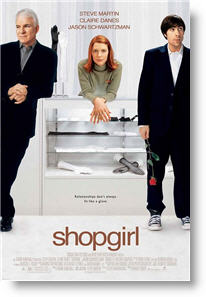Shopgirl
 for some sexual content and brief language.
for some sexual content and brief language.
Reviewed by: Misty Wagner
CONTRIBUTOR
| Moral Rating: | Very Offensive |
| Moviemaking Quality: |
|
| Primary Audience: | Adults |
| Genre: | Romance Comedy |
| Length: | 1 hr. 44 min. |
| Year of Release: | 2005 |
| USA Release: |
October 21, 2005 (NYC/LA), later widening |








Are there biblical examples of depression and how to deal with it? Answer
What should a Christian do if overwhelmed with depression? Answer
Fear, Anxiety and Worry—What does the Bible say? Answer
Does God feel our pain? Answer
For a follower of Christ, what is LOVE—a feeling, an emotion, or an action?
What is true love and how do you know when you have found it?

Learn how to make your love the best it can be. Christian answers to questions about sex, marriage, sexual addictions, and more. Valuable resources for Christian couples, singles and pastors.

Teens! Have questions? Find answers in our popular TeenQs section. Get answers to your questions about life, dating and much more.
| Featuring |
|---|
| Claire Danes, Jason Schwartzman, Steve Martin, Frances Conroy, Sam Bottoms, Bridgette Wilson-Sampras |
| Director |
|
Anand Tucker |
| Producer |
| Ashok Amritraj, Jon J. Jashni |
| Distributor |
Relationships don’t always fit like a glove.
The opening camera shots in “Shop Girl” focus on the chaos swarming within the city of Los Angeles—the busy interstate, the city itself, and finally throughout Sak’s Fifth Avenue. Much in the way the camera seems to glide over the tops of the downtown buildings, it focuses in and glides over the Sak’s make up counter with its tubes of lipsticks, shadows, blushers and powders on display. Everything shown in those first scenes is vibrant, filled with color and busy. The camera then moves up a floor, from the crowded make-up level, to a nearly vacant floor where dress fittings seem to take place, and there, at the end of the room, standing alone at the lonely glove counter is Mirabelle (Claire Danes).
From the moment we are introduced to Mirabelle Butterfield, she seems out of place in this hive of a city. As she passes other Sak’s employees on her way to and from work, she seems simplistic and plain in comparison. Silent and thoughtful, she seems lonely as the narrator (Steve Martin) explains that Mirabelle came here from Vermont, hoping to connect with others. Hoping to find love, perhaps.
As the film progresses, love interests develop. First, she meets the oddly charming and irresponsible Jeremy (Jason Shwartzman) while doing laundry. Later she is propositioned at work by Ray Porter (Steve Martin). Simplistic, on one hand, the plot of “Shop Girl” is simply that of a quiet girl wanting desperately to be loved, and having two very different men in her life—neither one being anything like what she would have expected or even sought out for herself.
On the other hand, this film is so much more. Well-written, beautifully-filmed and made quite personal by the performances of the actors, this movie will make many viewers fall in love with the character of Mirabelle, whom we learn suffers severely from depression. We begin to understand why her search for love may feel desperate to her as we gather tidbits of her family background. As she chooses to love Ray, who is obviously the more secure and protective choice, we see her perhaps change aspects herself. She seems to do things less for herself and more for Ray, to please him—to help him love her.
Viewers are shown each person’s perspective, as he believes they have an “understanding” (that this is a casual-sex type of arrangement), while she believes she is falling in love with him, and possibly he with her.
Jeremy, inspired by Mirabelle, goes on a quest of his own to find something more in life then the dead end for which he has settled.
This film does a well-rounded job of keeping the audience clued-in to each character’s thoughts and motivations, how they are feeling and at times, even why they are feeling as they do. “Shop Girl” is a beautiful analogy of why casual sex doesn’t turn out well, and why the feeling that someone else loves you doesn’t truly make life any easier, often it only tends to complicate things more.
Though quite emotional and sad at times, this thoughtful film does inspire laughter and carries a balance between depth and lightheartedness.
“Shop Girl” is based on the novel written by Steve Martin. It is a film that many may find easy to love, while many others will probably find it too offensive.
The language in this film, I felt, was moderate, but there are many implied sex scenes. There is nudity—a shower scene shows very brief nudity while another longer scene shows full body backside nudity. Sex is predominant throughout the film, both in scenes as well as in some dialogue. There is one scene of masturbation, and one character (who is a co-worker of Mirabelle) is in a scene where it is implied that intercourse occurred, and there is sex-toy memorabilia present throughout the scene.
Although strong and sometimes edging slightly close to disturbing, I doubt there are many who can walk away from it and take nothing with them. Though not a common scenario that most will face, the themes in this movie are real. Depression is real; the search for love and the lifelong quest to feel loveable is very relatable. I felt this film did a beautiful job in painting a picture that can encourage some, connect with others, and ultimately touch and inspire people in a way that God can use.
Violence: None / Profanity: Moderate / Sex/Nudity: Moderate
See list of Relevant Issues—questions-and-answers.


Although I enjoyed the film for what it was, it was very secular in that casual sex was considered quite normal. And the sex scenes were tasteful, but since no one was married, they would not be acceptable in the eyes of God. Without the sex, the film would have been much more wholesome, but then it would have been less realistic, unfortunately, based on today’s standards of sex.
I wouldn’t recommend this film to anyone, but wouldn’t discourage it either, except to kids under 18. I found the characters to be quite likable and each had depth to their personalities. So, if you go into it knowing it’s created for mass appeal, it is enjoyable for the most part.
Very Offensive / 4
Excellent! / 4½
Meanwhile, there is Jeremy. Jeremy doesn’t seem to be able to offer Mirabelle any of the material things that Ray Porter can, but he has the potential to give her the one thing Ray Porter cannot: real love. It’s a beautiful story about the loneliness that you can feel in your 20s, especially in the microcosm of Los Angeles.
Average / 4
Very Offensive / 2½

My Ratings: Very Offensive / 2½